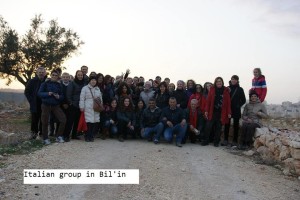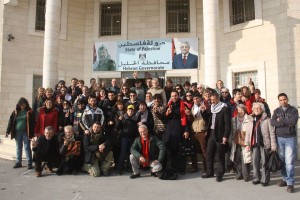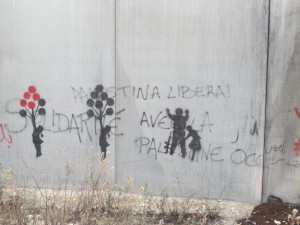I have been to Palestine
dicembre 11, 2014 in Palestina, Traduzioni da Anna Zorzi
Written by Sonia Trovato, translated by Anna Zorzi ![]()
I t’s 3 o’ clock a.m. After a long, intense day in the Jordan Valley now you are at the Ben Gurion airport in Tel Aviv. Your sleepy eyes are offended by the bright lights of the departures hall. You should have had a nap in the few remaining hours of the night, but you didn’t and now you ‘re in the queue waiting for your turn to go through the complex procedures of security under the suspicious look of the officer opposite you. You are nearly going to nod off when a giant man and the two doubles of Sonya Blake in Mortal Kombat surround you and the others of the group.
t’s 3 o’ clock a.m. After a long, intense day in the Jordan Valley now you are at the Ben Gurion airport in Tel Aviv. Your sleepy eyes are offended by the bright lights of the departures hall. You should have had a nap in the few remaining hours of the night, but you didn’t and now you ‘re in the queue waiting for your turn to go through the complex procedures of security under the suspicious look of the officer opposite you. You are nearly going to nod off when a giant man and the two doubles of Sonya Blake in Mortal Kombat surround you and the others of the group.
They start asking idiot questions like: “Do you know each other?” “Did you already know each other before now?” “Why are you travelling on your own without your parents?” (“travelling without your parents?” Are we back in the Victorian Age?). First everybody is asked the same questions, then the cross-examination starts so that the officers check if the answers are true. All this is a sort of warming-up, as the real, official interrogation is going to come very soon.
And it starts with an idiotic test in ungrammatical Italian: it’s a multiple-choice test where you have to choose the correct option, (in other words: the best option so as not to be considered a potential terrorist). Then other questions follow: who packed your suitcase? (you can tick even the box “I don’t know”); did you keep your suitcase always with you?(except for the trunk of the bus, where the Ben Gurion staff hoped you were stuck in, yes you did); have you got knives on you? (Oh, yes, you have the complete set of Miracol Blade); did anybody give you a present or something to take to Italy? (A Palestinian boy gave you a key-rings in Hebron to thank you for your tears during the visit of the ghetto of the historic centre of the town. As a matter of fact new tears come to your eyes if you think about it again. Perhaps this memory affected the following interrogation, or perhaps it was only a random reaction or a moody one).
At the end of the interrogation your luggage and documents get a yellow sticker, full of numbers. Later on, you will find out that the yellow sticker with those numbers is for the visitors considered militant and not ordinary tourists. Why you were put in the first category is still a mystery. The numbers in your sticker mean that you must be separated from the rest of your group: the luckiest go on with the regular passport and luggage control, you are not among these ones. While waiting for your turn , you observe quite nervously what is happening to some travelling companions: in Katia’s trolley a UNO leaflet is found. That’s enough for the security staff to make any type of conjectures. You have very little time to mentally list all the objects which couldn’t be appreciated by the policemen – the kefiah bought at Hebron or the Palestinian scarf received from the mayor of Bethlehem or the dvd Five broken cameras, which you wrapped and hoped nobody would tear it open. Now it’s your turn: a grease-haired guy has already started emptying your checked baggage. “Is it your first time in Israel?” – “Yes, it is”- “It won’t be the last, I hope”- he says, winking at you. “No, it won’t” you reply and you look away, ashamed of this complaisance of yours. But then you feel humiliated when you see the guy rummage in your dirty laundry and touch your bras with an allusive smile, which his comrade openly shows. “Pull out all the electrical things” he orders to you peremptorily . Electrical things, oh my God, electrical things: the mobile , the digital camera, their battery chargers, the ipod… No, the detector of electricity keeps sounding. “I have nothing else…I swear. I can’t understand”. And then everything is clear: it was the battery charger of the ipod which set off the detector alarm. Then you go through the customs, escorted by two policemen. You think the worst has gone, but then you realize the checking of the hand luggage is still tougher.
There are few of you in this area, because those who were cold-blooded in the previous checking now are allowed to board the plane. It is like in Dante’s Hell, where the turn of the officers decides where you have to stay. The Minosse of this round stares at you with his small, cold eyes. “Are you travelling in a group? Which one? What’s the group leader’s name? Where have you been?” You are still answering these questions, that you hear the man say “Oh God, God, God” and you realize that nothing good seems to come . Minosse has found the three kefiahs and he is waving them to you disappointedly. Another officer arrives, a thin one, and he fires out questions: “Do you know what these scarves are? Do you know what they represent? Are you a political agitator?” You try to explain him that the kefiahs are like souvenirs, you can buy them at any market in Jerusalem (even though you didn’t get them there…..).As for the political matter, you don’t know what to say: reading, keeping up-to-date, informing people, not being satisfied with official information doesn’t mean to be into politics. But then other questions are asked, which leave you astonished: “What are your parents’ names? And your grandparents’? And your great-grandparents’?” Great-grandparents? Who knows it? It’s ages since I last draw my family tree and learnt it by heart at the elementary school. That’s too much! “I don’t know my great-grandparents’ names, I’m afraid”. “Are they Italian?” asks the thin man.
Ah, that’s the point. He wants to check that there are no Arabs in your family.”Yes, they are Italian. They all are Italian” you snap back at him angrily. “Are you religious?” –“I am Christian by culture, but I’m not a believer. Nobody in my family is”. You don’t care if he is satisfied with this answer, you are too involved in thinking that if any Arab country asked its tourists such embarrassingly racist questions western countries would denounce it as outrageous . Israel does it, but it enjoys the protection of the US and other countries, so nobody complains about it.
 Then it is the turn of your books. You have packed two of them : A Farewell to Arms by Hemingway and Se questo è un uomo by Primo Levi. The first one reminds you of the arms produced by the factories in the valley near your hometown and sold to Israel and you can’t but think that this way your country becomes an accomplice to Israel in the so-called Ethnical Cleansing of Palestine, as the Jewish historian Ilan Pappè defined it. The other book reminds you of the resignation in the eyes of the people waiting at the check-point or the anger of the kids who throw stones or the terror of the young for the violence of the settlers and you can’t but wonder how these people can feel human or more similar to a beast after 70 years of mistreatment. The thin officer asks you to translate the titles. You give a funny version of Farewell to Arms because of your broken English and as for the second book you make reference to the author, Primo Levi, and describe him as a survivor from Auschwiz. The dumb look of the policeman reveals his complete ignorance about Primo Levi. Primo Levi, the Jewish writer who risked to be a victim of the anti-Semitism, the same anti-Semitism which Israel is making a lot of fuss about whenever some criticism against its policy is made, should have rung many bells to the officer, and yet…
Then it is the turn of your books. You have packed two of them : A Farewell to Arms by Hemingway and Se questo è un uomo by Primo Levi. The first one reminds you of the arms produced by the factories in the valley near your hometown and sold to Israel and you can’t but think that this way your country becomes an accomplice to Israel in the so-called Ethnical Cleansing of Palestine, as the Jewish historian Ilan Pappè defined it. The other book reminds you of the resignation in the eyes of the people waiting at the check-point or the anger of the kids who throw stones or the terror of the young for the violence of the settlers and you can’t but wonder how these people can feel human or more similar to a beast after 70 years of mistreatment. The thin officer asks you to translate the titles. You give a funny version of Farewell to Arms because of your broken English and as for the second book you make reference to the author, Primo Levi, and describe him as a survivor from Auschwiz. The dumb look of the policeman reveals his complete ignorance about Primo Levi. Primo Levi, the Jewish writer who risked to be a victim of the anti-Semitism, the same anti-Semitism which Israel is making a lot of fuss about whenever some criticism against its policy is made, should have rung many bells to the officer, and yet…
You go through the metal detector and then the exhausting interrogation is over, you run to the boarding gates, which are going to close. You are on the plane now, it takes off and you are so absorbed in your thoughts that you aren’t even aware of the flight hours or the stop-over at Istanbul. You think how this wonderful, wretched land has impressed your mind and penetrated your skin. When the plane lands at the Italian airport the quick document checking procedures make you feel like hugging the plump policewoman. “Have you been to Israel?” she asks you.
All at once the people who made this experience unforgettable come to your mind: Luisa Morgantini, who took you to Palestine, 52 travelling companions, who thought like you that 8 days spent knowing and understanding are much more worthwhile than a new year’s eve party at the disco, Fadwa Barghouti, an example of love and feminism, the people living in Bil’in, the brave volunteers of Zochrot, Samer Issawi, hurt but proud, Huda, whose obstinacy was portrayed in Suad Amiry’s latest book, the young of Operazione Colomba, Sami Huraini, only sixteen but ready to be a partisan, the women of the Handicraft Cooperative, busy with a double resistance, the one against the Israeli occupation and the one against their husbands’ patriarchal culture, the miserable kid in At-Tuwani with his face excoriated who wanted you to take him away from the violence which is destroying his childhood, Issa, Izzat, Javad and the others of YAS, Mike and his warm hands made of bread, Miguel ,your next-seat passenger who will become your penfriend, the smiling kids of the Jordan Valley, and in the end Yehuda Shaul, Nurit Peled-Elhanan, Michele Giorgio, Chiara Cruciati, Luca Ricciardi who have informed you.
“No,” I reply “I have been to Palestine”.






